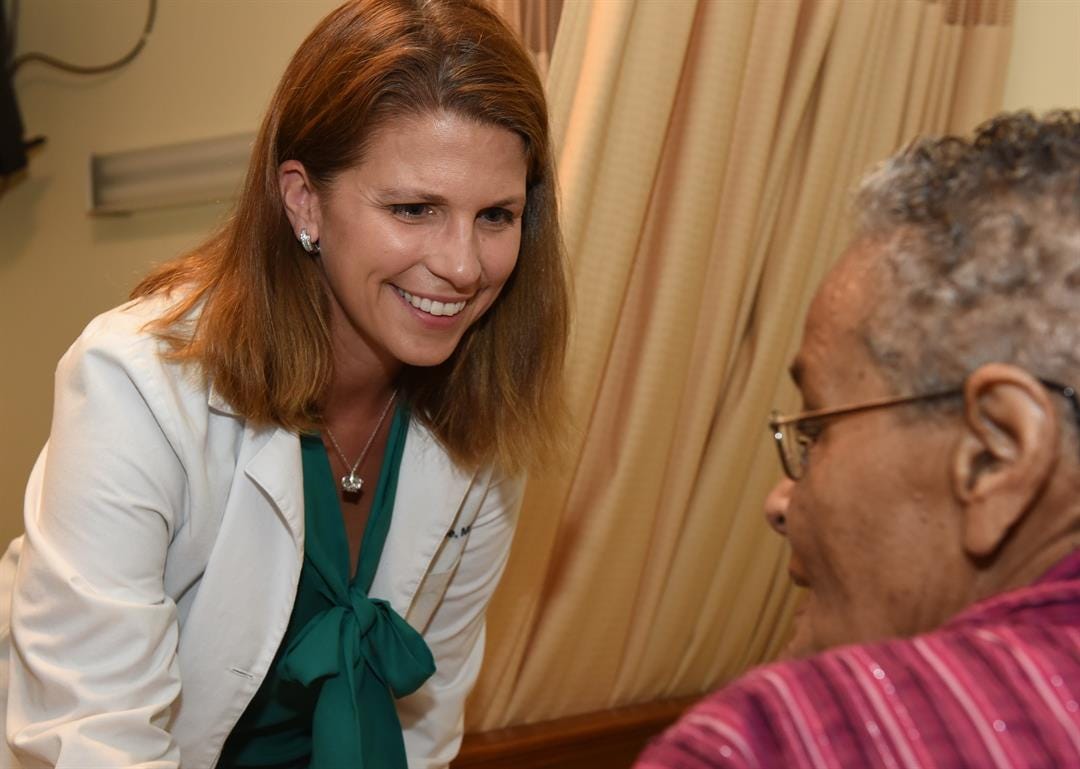Nursing Home Crisis Sharpens Mission for Probari
 Unroe says she knew as a child that she wanted to work with the elderly.
Unroe says she knew as a child that she wanted to work with the elderly.
Subscriber Benefit
As a subscriber you can listen to articles at work, in the car, or while you work out. Subscribe NowNursing homes and other long-term care facilities have been the hardest hit by the pandemic, accounting for nearly half of all COVID-19 deaths in Indiana. Experts in the field say the pandemic is exposing areas of weakness that have long existed in the healthcare setting. “Intense,” “tragic” and “grim” are all words used by longtime geriatrician Dr. Kathleen Unroe to describe the plight of nursing homes during the pandemic. Long before COVID-19 preyed upon this portion of the medical system, Unroe’s startup, Probari, was working to improve the care model at nursing homes—and the health crisis has only heightened its resolve.
“Probari’s sole purpose is to support [nursing facility] staff in doing this important work every day, to provide the best possible care to this very vulnerable population,” says Unroe, Probari president and chief executive officer. “The problems we are trying to address with our startup were problems a year ago, 10 years ago. But now, because of the extreme vulnerability of this population, there’s a bright light shining on how we can’t tolerate not having the best possible communication lines among all stakeholders in nursing facilities; we can’t tolerate not doing high-quality advanced care planning for all residents, and we must catch an acute change in status as soon as it happens.”
Unroe founded Indianapolis-based Probari more than two years ago while serving as principal investigator for OPTIMISTIC, an eight-year, $30 million ongoing demonstration project funded by the Centers for Medicare & Medicaid Services. Working with 40 Indiana nursing homes, the project aims to improve quality of care and reduce unnecessary transfers to the hospital.
An independent evaluation showed the program reduced the number of avoidable hospitalizations by 33% and lowered Medicare expenses an average of $1,589 per resident annually, creating a net savings of more than $3 million between 2014 and 2016. The project’s success and leaders’ desire to expand its impact gave birth to Probari, which means “proven” in Latin.
The startup embeds a registered nurse in a nursing home who is specially trained in recognizing early warning signs of changes in residents’ condition and creating a plan to monitor and treat them before the problem escalates; and guiding systematic advanced care planning, understanding resident and family goals for care and how to honor them.
“All of this is critical right now during the pandemic,” says Unroe, who is also a research scientist at the Regenstrief Institute’s Center for Aging Research. “We take care of very medically complex, frail and vulnerable residents in [the nursing home] setting; now everyone is becoming very aware of this. These supports are very needed now, but they’re needed every day; it’s just that much more intense right now.”
Hungry for expertise to help Indiana’s 543 nursing homes suffering under the weight of the pandemic, the Indiana State Department of Health contracted with Probari to boost outreach and support for the facilities statewide. Unroe says Probari came alongside ISDH staff beginning in early April to help convey results from COVID-19 testing and share best practices for infection control, and the startup continues with those efforts.
At the time of publication, ISDH data shows 1,166 nursing home deaths, which account for nearly half of the total deaths in Indiana attributed to COVID-19. Additionally, 277 long-term care facilities have had at least one positive case, including the nursing home where Unroe sees patients, which she says experienced a significant outbreak. She describes the nursing home as excellent, with “so many of the hallmarks of a high-quality facility.”
“And yet, we were not invulnerable to this by preparing, as facilities did across the country—working hard to stock up on PPE and responding as quickly as possible,” says Unroe. “And that’s a big takeaway. The research that’s coming out about [the impact of this virus in nursing homes] is that it is not some selection of poor-quality nursing homes that had huge numbers of infection, and the higher-quality nursing homes were spared. No. What we’re learning is that all nursing facilities need access to testing, PPE and help and support to deal with enormous challenges like this pandemic has presented.”
Partnering with the state and leading Indiana’s nursing homes through their most difficult times—and even weathering a large outbreak at her own facility—has further convinced Unroe that Probari’s mission meets a desperate need.
“[The pandemic] is shining a bright light on where we’re still falling short in long-term care…and I hope there can be attention on long-term fixes for some of those issues,” says Unroe. “Those are the kinds of things our company can help with, and what we’ve have spent years doing research on and studying at Indiana University and Regenstrief.”
Unroe says COVID-19 is “unbelievably difficult to control” once it’s inside a nursing home building.
As part of its contract with the ISDH, Unroe says Probari is helping with the effort to test all nursing home staff in Indiana for COVID-19.
Unroe says the full impact of the pandemic on nursing homes remains to be seen, as many will likely struggle financially.
